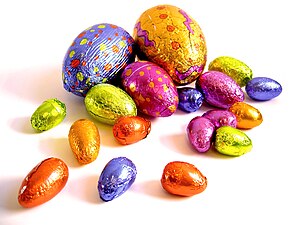 Image via Wikipedia
Image via Wikipedia Apr 21, 2011 09:29 AM
When British children tuck into their Easter eggs on Sunday, few will know their chocolate treats have been made by African children working as modern day slaves.
Sixty per cent of the chocolate in UK shops is produced using cocoa beans from Ghana and the Ivory Coast.
Last year, posing as cocoa dealers, a BBC team found a significant chunk of the chocolate sold in the UK is produced by children as young as eight forced to work seven hours a day.
A new report released by World Vision is asking people to slow down on their chocolate eggs and think of exploited children this Easter.
“We’re eating cheap chocolate because of trafficked children, child slavery and hazardous labour,” said the charity’s Tim Costello.
About 97 per cent of the world’s supply of chocolate does not have the ethics certificate showing that they were made without using forced and child labour, the report said.
It also revealed that as well as child labour, human trafficking is playing a huge part in making chocolates.
World Vision is suggesting a few simple strategies to wipe out child labour in chocolate production. It is calling for a certificate scheme to prove no child labour was used in making each product. Child labour is often used to make up for the lower prices, it says.
The BBC’s Panorama: Chocolate, the Bitter Truth a made a big impact raising awareness and promoting the fact that people need to take more responsibility for the food they eat and where it comes from.
Reporter Paul Kenyon investigated the supply chain that delivers most of the chocolate sold in the UK, more than half a million tonnes a year. He found evidence of human trafficking and child slave labour. The programme also found that there is no guarantee, despite safeguards, even with chocolate marketed as FairTrade, that child labour has not been used at least somewhere along the supply chain. By the time it hits the High Street, cocoa is very hard to trace.
In a village in Ghana, Kenyon met 12-year-old Ouare Fatao Kwakou, who was sold to traffickers by his uncle and taken from neighbouring Burkina Faso to work as a cocoa picker. More than a year later, he had not been paid a penny for his work - the profits of his labour went instead to his new cocoa masters and to the uncle who sold him.

Source: soschildrensvillages.org.uk


No comments:
Post a Comment